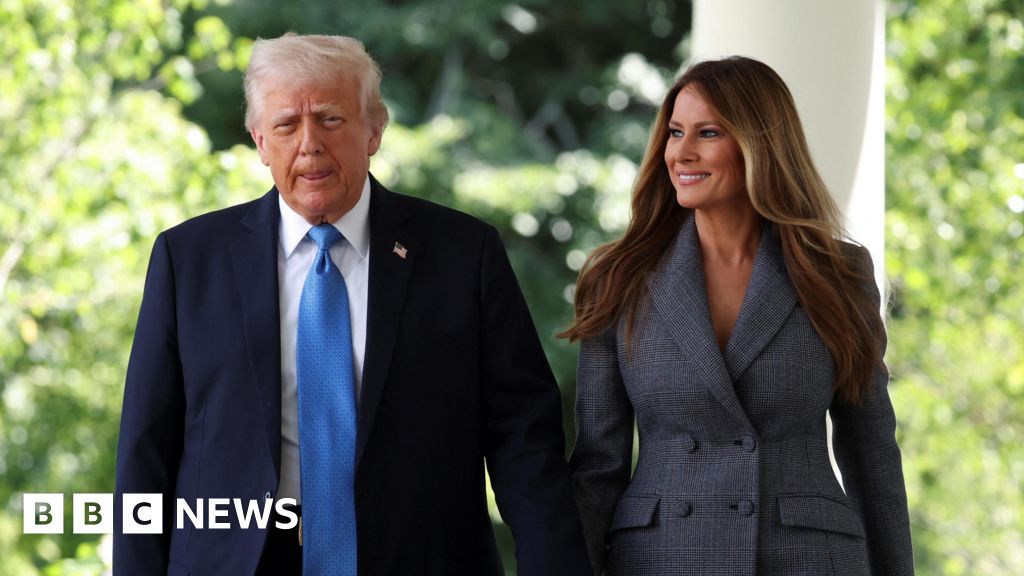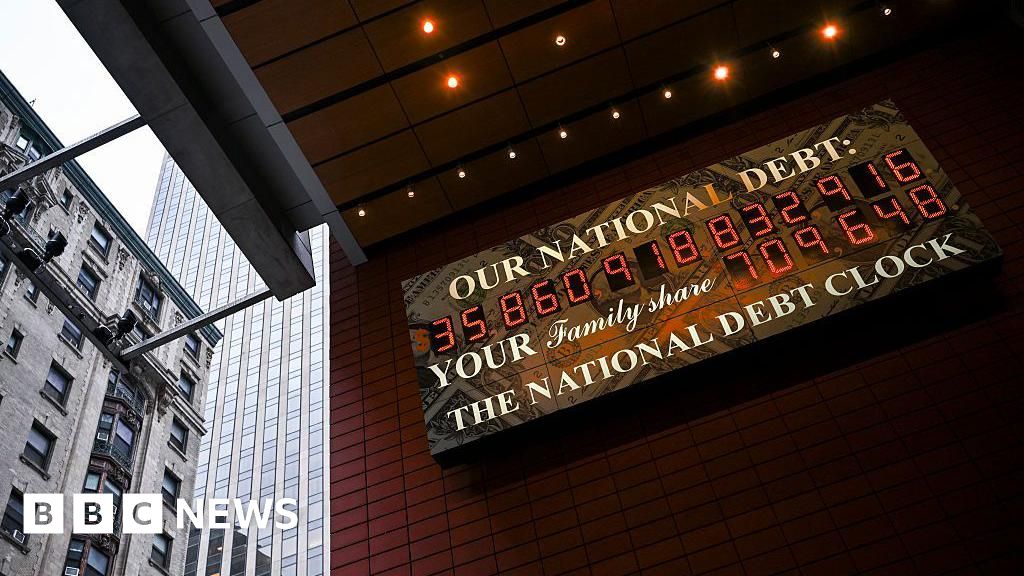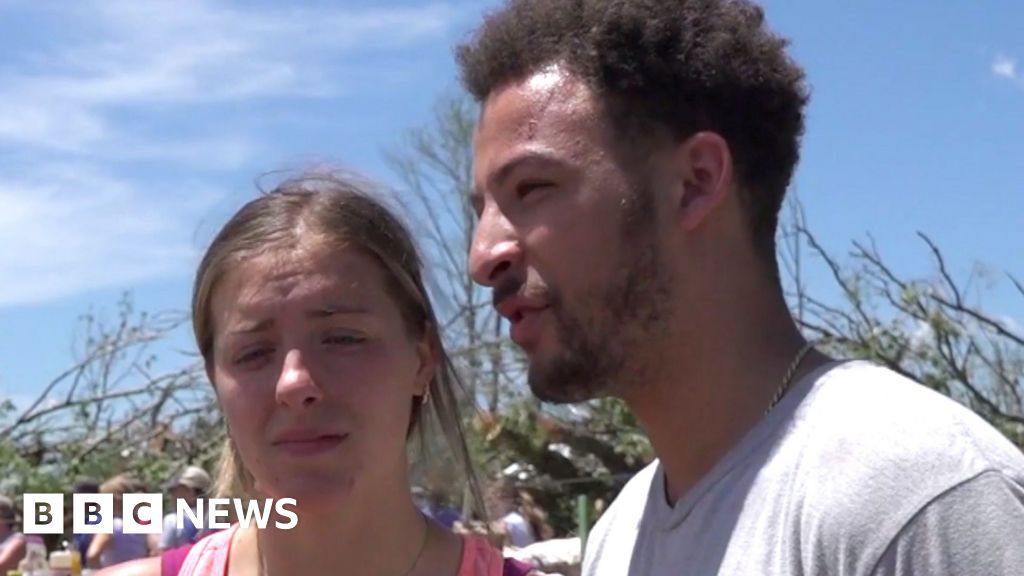ARTICLE AD BOX
By Sam Cabral
BBC News, Washington
Image source, Getty Images
Image caption,Sean O'Brien (left) is the new president of the International Brotherhood of Teamsters
It is not a surprise when Sean O'Brien tells the BBC that he plans to take one of America's largest labour unions from "complacency" to "militancy".
On Tuesday, Mr O'Brien, 49, became the first new president in 23 years to take the helm of the International Brotherhood of Teamsters - a 1.4 million member union that represents professions from warehouse workers to freight drivers - and he has made it known that he is aching for a fight.
"Over the last 10 years, there hasn't been any vigilance, any militancy, and corporate America knew that," he said, speaking to the BBC after his election last year.
Under his tenure, "we're going to put the Teamsters back on the map", he said.
Mr O'Brien has vowed to re-negotiate "substandard" and "concessionary" national contracts with companies like United Parcel Service (UPS), one of the largest mail carriers in the US, and says he will not shy away from walkouts if his demands are not met.
And he has an even bigger goal in his sights: taking on Amazon.
"We've got to protect, preserve and improve working conditions," he said.
Image source, Getty Images
Image caption,James Hoffa marches at a rally in 1999
In many places, the Teamsters are almost synonymous with US labour unionism, founded in the early heyday of a movement that began in the country in the 19th Century.
That was true for Mr O'Brien, a Boston native who is a fourth-generation member. His father, grandfather and great-grandfather were all truck drivers with the union.
As a boy, he watched his father get up at 4am and come home late at night. Sometimes he would tag along to union meetings. "I adored the camaraderie," he recalled.
"I learned what it was to be a union member around the dinner table," he said.
At 18, he joined the Teamsters as a rigger, hauling heavy equipment around construction sites. Since 2006, Mr O'Brien has represented some 12,000 Bostonians and their families as head of the Local 25 union.
He took credit for 19 strikes during his tenure, the majority of which he says the union won.
Now in his 32nd year with the Teamsters, his is a familiar face. He was previously the vice-president of the national union's eastern region. "I love this organisation," he said. "It has given me everything in my entire life".
But today, "we have a whole new workforce coming in that weren't raised part of a union, didn't get free healthcare and weren't guaranteed pensions", Mr O'Brien said.
"This new generation is not afraid to fight, but they're only going to fight if they have strong leadership and strong support."
Image source, Getty Images
Image caption,Jimmy Hoffa vanished without a trace in 1975
But the organisation in modern times has vacillated between becoming a byword for grift and gangsterism - or stagnation.
For 36 of its 119 years, the Teamsters had been led by someone with the surname Hoffa.
The first, Jimmy, was notorious for using the strength of the union to bolster organised crime.
Hoffa was not the first to forge links between unionism and crime; the inaugural Teamsters boss Cornelius Shea was indicted for embezzlement in 1908, and early Teamster leaders were known to collude with employers to price-fix.
But under Hoffa's watch, the mafia gained influence at its highest leadership levels, including its executive board. Mobsters raided the Teamsters' most important pension fund to bankroll their development projects in Las Vegas.
Despite the union being mired in corruption, "the contradiction is he builds a union that's quite powerful", said David Witwer, a labour historian at Penn State Harrisburg University.
Hoffa was "a true icon of the Teamsters Union", Mr O'Brien told Boston Magazine. "We had tremendous political clout on [Jimmy Hoffa's] watch."
But the reputation of Teamsters as blue-collar toughs willing to walk on the wrong side of the law has stuck. Even in the early 1990s, Teamsters were being charged with racketeering crimes.
Mr O'Brien has previously said that it is hard to get away from the reputation. "But the bottom line is that there's no organised crime presence in the Teamsters Union," he told Boston Magazine.
Hoffa, who led the Teamsters from 1957 to 1971, disappeared in 1975 at the time of a planned meeting with Detroit mafiosi.
Image source, Paul Trujillo
Image caption,Paul Trujillo (left) voted for "change" when he supported Sean O'Brien's campaign last year
His son, James, took over in 1998. Though gone were the mobsters on speed dial, many - including Mr O'Brien - argue that his tenure has left the union at its weakest and most divided in years.
The union's power has "declined in every meaningful way, from contracts to pensions to member involvement", said David Levin, lead organiser at the Teamsters for a Democratic Union (TDU), an internal reform group that backed Mr O'Brien.
It was because James Hoffa "talked tough, settled short and declared victory", Mr Levin lamented.
Mr Hoffa declined to comment for this story.
In November, the candidate he hand-picked was defeated by Mr O'Brien by a two-to-one margin.
Much of the recent frustration with Mr O'Brien's predecessor arose from 2017 negotiations with UPS for a new national contract.
As president, Mr O'Brien has said he will take that on.
"A lot of companies - not just UPS but several major employers - knew that the Teamsters union wasn't going to strike," he said.
"The empty threats need to be realities moving forward".
The Teamsters have not had a national walkout since 1997. Its defence fund for members on strike has ballooned to over $300m (£226m) under Mr Hoffa.
Mr O'Brien's contention is that, if he fights hard for better contracts, he can mobilise his members to recruit warehouse workers at Amazon.
"That means being tough at the negotiating table and using a template that we can take to unorganised workers," he said.
Pro-labour sentiment is trending upward in the US, both at the picket line and in the Biden administration, he points out.
"Think about it: we oversee and run every mode of transportation for the entire country, whether it's planes, trains, boats or trucks. We've got a great opportunity here".

 3 years ago
56
3 years ago
56








 English (US) ·
English (US) ·